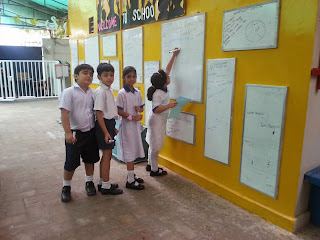Global Dignity Day Celebrated
There is no one “right” way to celebrate Global Dignity Day – every country, every school, and every classroom may have a unique way to discuss dignity.
In a day and age where there is so much conflict in the world (between cultures, religions, generations, socioeconomic classes, and more) there is a great need for broad agreement on something unifying, something that encourages and even grows a sense of community. That something is dignity.
Global Dignity Day 2013 builds upon the great success of last year’s event during which 300.000 young people participated across 50 countries. Young Global Leaders and other volunteers organized events in an effort to instill and inspire a new, more positive, inclusive and interconnected value proposition in students for their lives as they grow into adulthood.
Our class participants celebrated Global Dignity Day by watching a video clip related to dignity followed by an interview the children prepared from one of our helpers at school Mr.Jimmy.
later,the children prepared posters,thankyou cards and pledges for the dignity day'13.





























































